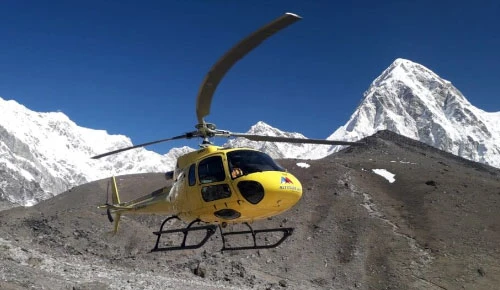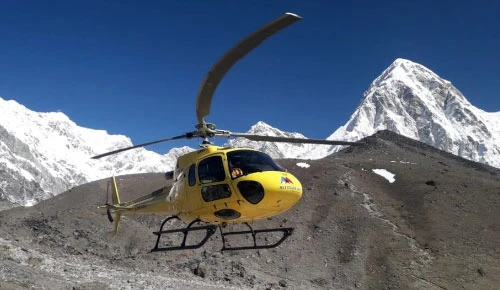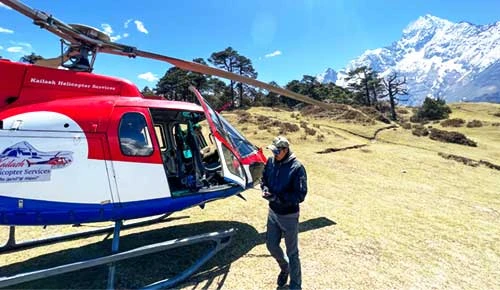Solo Female Trekking To Everest Base Camp
The Everest Base Camp Trek, a journey to the foot of the world's highest mountain, is an adventure that beckons trekkers from around the globe. While the trek offers an unparalleled encounter with nature's grandeur, solo female travelers may face unique challenges and considerations.
Solo female trekking is an incredible adventure that many women are pursuing. It's about the thrill and empowerment of exploring the Himalayas alone as a woman. The journey is not just about reaching the base camp of the world's highest mountain; it's a testament to strength, courage, and independence.
Table of Contents
Benefits of Solo Trekking
It takes courage, determination, and resilience to hike for days or weeks on your own. When you reach the end of your trek, you'll have a newfound sense of self-confidence that you can carry with you into other areas of your life.
Solo trekking can be a great way to clear your head and gain some perspective on your life. When you're removed from the hustle and bustle of everyday life, you have the time and space to reflect on your thoughts and feelings. This can lead to greater self-awareness and a better understanding of your priorities.
When you're trekking solo, you're free to immerse yourself completely in the natural world around you. Without the distractions of conversation or group dynamics, you can focus on the sounds of the wind in the trees, the feel of the sun on your skin, and the scent of the pine needles. This heightened awareness can lead to a deeper appreciation for the beauty and power of nature.
Is Everest Base Camp Safe for Solo Female Travelers?
Yes, EBC is a safe destination for solo female travelers, especially when compared to other trekking destinations in Nepal or around the world. The local communities are well-accustomed to hosting trekkers, and there is a strong sense of respect for humans in Nepali culture. However, it is important to take precautions and be aware of your surroundings to ensure your safety.

Safety Statistics
According to a 2022 report by the Nepal Tourism Board, there were no reported cases of assault or violence against female trekkers in Nepal. The report also states that the overall crime rate in Nepal is relatively low.
Several factors contribute to the safety of solo female travelers in EBC:
Strong Community Support: The local communities in the Everest region are well aware of the importance of tourism to their economies. They are generally welcoming and helpful to trekkers, and they have a strong interest in protecting their reputation as a safe destination.
Cultural Respect for Women: Nepali culture has a strong tradition of respect for women. Women are typically treated with deference, and there is a low tolerance for violence against women.
Presence of Trekking Companies and Guides: The presence of reputable trekking companies and local guides provides an additional layer of safety for solo female travelers. Trekking companies have a vested interest in ensuring the safety of their clients, and guides can provide valuable support and guidance.
Solo vs. Group Trekking: A Comparative Analysis
Costs:
- Solo trekkers incur higher overall expenses due to a lack of shared costs.
- Higher individual expenses for transportation, guide fees, and accommodation.
- Solo travelers may face higher meal costs without group discounts.
Accommodations:
- Solo trekkers find it challenging to secure suitable accommodations, especially during peak seasons.
- Popular guest houses prioritize larger groups, leaving solo travelers with limited options.
- In Namche Bazaar, solo trekkers pay $50–$70 per night, while group members pay $40–$55 due to shared costs.
Permits:
- Permit requirements are the same for both solo and group trekkers.
- All trekkers need a TIMS card ($20) and a National Park Permit ($30 for foreigners, $10 for Nepalese citizens).
- Similar permit acquisition process, but solo travelers may experience longer wait times at offices due to individual applications.
Female-Specific Packaging List:
- Sports bras
- Menstrual products (menstrual cups, pads, or tampons)
- Pain relievers for menstrual cramps
- Heat packs or hot water bottles for menstrual cramps
- Hand wipes or wet wipes
- Small mirror
- Hairbrush or comb
Managing Your Menstrual Cycle During the Trek
Menstruation can be a challenging aspect of any outdoor adventure, and trekking to Everest Base Camp is no exception. The high altitude, strenuous activity, and limited access to amenities can make managing your menstrual cycle even more difficult.

However, with proper planning and preparation, you can minimize any disruptions to your trek and ensure a comfortable and enjoyable experience
- Knowing your cycle can help you anticipate when you'll need to manage your period during the trek.
- Menstrual cups are reusable, leak-proof, and comfortable, making them ideal for long treks.
- They require fewer changes, which is crucial in remote areas.
- Plan ahead and ensure you have enough pads, tampons, or menstrual cups.
- Wash your hands frequently with soap and water.
- Carry hand sanitizer for situations without access to water.
- Boil or use a sterilizing solution to keep it clean and safe.
- Pads/tampons every 4-6 hours or menstrual cups every 12 hours.
- Include ibuprofen or acetaminophen to manage menstrual cramps.
- These can provide relief from menstrual cramps.
- Allow yourself time to recover during the trek, especially during your period.
By following these tips, you can effectively manage your menstrual cycle while trekking and focus on enjoying the incredible journey without unnecessary disruptions.
Necessity of a Guide on the Everest Trail
As of April 1, 2023, the government of Nepal has implemented a new regulation requiring all solo trekkers to Everest Base Camp to be accompanied by a licensed guide. This decision was made to enhance the safety and well-being of solo travelers, particularly female solo travelers, who may face additional challenges and risks while trekking in remote areas.
The requirement for a guide is crucial for several reasons, as evidenced by data:
- 102 deaths were reported (2016–2021) among trekkers.
- 35% of fatalities involved solo trekkers.
- Solo trekkers are twice as likely to experience severe altitude sickness (Journal of Travel Medicine).
- 23% of solo trekkers (2022 survey) felt uncomfortable due to cultural misunderstandings.
- 42% of solo trekkers faced language barriers in remote Nepal (Nepal Tourism Board, 2021).
- 70% of trekker rescues in Everest involved solo trekkers (Himalayan Rescue Association, 2023).
- Guides are essential for solo trekkers, serving as translators and ensuring effective communication. They monitor conditions, advise on acclimatization, and enhance safety by identifying hazards. In emergencies, guides offer immediate assistance, administer first aid, and coordinate medical evacuations, providing crucial support throughout the solo trekking experience
In conclusion
The Everest Base Camp trek is a captivating adventure for solo female travelers, offering a unique connection with nature's grandeur. The region is generally safe, thanks to strong community support, cultural respect for women, and the presence of guides.
Managing your menstrual cycle, cultural sensitivity, and the recently implemented guide requirement are essential considerations. Solo hikers should be well-prepared, stay informed, and embrace the adventure while prioritizing safety and comfort. Whether trekking solo or in a group, the journey promises unforgettable experiences and personal growth amidst the Himalayan splendor.








